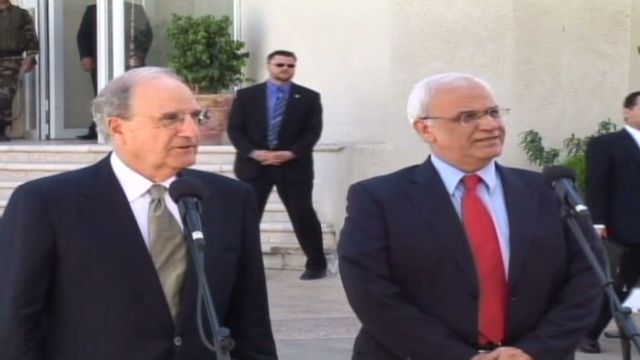 Ramallah, West Bank (CNN) -- George Mitchell, the U.S. envoy to the Middle East, said he held "candid" and "productive" talks on Saturday with Palestinian leaders in his latest push to advance direct peace talks between Israelis and Palestinians.
Ramallah, West Bank (CNN) -- George Mitchell, the U.S. envoy to the Middle East, said he held "candid" and "productive" talks on Saturday with Palestinian leaders in his latest push to advance direct peace talks between Israelis and Palestinians.
Mitchell met Palestinian Authority President Mahmoud Abbas, chief Palestinian negotiator Saeb Erakat and other Palestinian officials. The meeting comes a day after Mitchell met with Israeli Prime Minister Benjamin Netanyahu.
Mitchell has been shuttling between Jerusalem and Ramallah as a go-between because Netanyahu and Abbas have not been talking directly.
Netanyahu has told Israeli Cabinet officials that he is ready to meet with Abbas at any time. But Israeli media outlets were reporting that Abbas has not been keen on resuming direct talks at present.
Speaking to reporters after the meeting with Abbas, Mitchell reiterated President Barack Obama's vision of "comprehensive peace," which includes a two-state solution for Israelis and the Palestinians, peace between Israel and Syria, and normal relations between Israel and the rest of the region.
"We recognize the difficulties and complexities involved in trying to realize this vision but we are determined to continue our efforts," Mitchell said in a statement after the meeting at the presidential compound in Ramallah.
"We are heartened by the discussions that we had heard today and the past several days, I will now visit several other countries in the region for discussions with leaders in some of the neighboring countries and our efforts will continue in that regard."
There have been tensions between Israel and Palestinians lately over the demolition of Palestinian homes in East Jerusalem and Israel's policies in Gaza, and they have affected the future of peace talks.
Housing in East Jerusalem has become a hot-button issue in the Mideast peace process. In March, the Israeli government announced the construction of 1,600 housing units in East Jerusalem as U.S. Vice President Joe Biden was
visiting the Jewish state.
The announcement outraged the Obama administration and led to the Palestinian withdrawal from agreed-upon indirect negotiations with Israel.
In a visit later that month to the United States, Netanyahu was presented with a set of concessions that the White House
wanted to see Israel make in an effort to restart negotiations with the Palestinians.
Neither government detailed what the exact nature of the concessions were, but sources on both sides said a halt in East Jerusalem construction was among the demands from the Obama administration.
However, Netanyahu has said there will be no freeze on building in East Jerusalem. Israel seized the area from Jordan during the Six Day War in 1967 and considers it part of its sovereign capital -- a claim not recognized by the
international community. Palestinians want East Jerusalem as the future capital of their state.
There has been longstanding anger among Palestinians over Israel's invasion of Gaza in late 2008, with the last round of peace talks breaking down over the three-week military offensive against Hamas, the movement that runs Gaza. That operation was designed to stop the firing of rockets at Israeli towns and many Palestinian civilians were killed.
There also has been outrage among Palestinians over Israel's blockade of Gaza, a policy that Israel says it is carrying out to thwart the smuggling of weapons to Hamas.
A May 31 Israeli raid on a Gaza-bound Turkish ship laden with aid for the territory left nine of the activists on board dead, a move that prompted international condemnation. Critics say Israel's blockade of aid has caused misery among the people of Gaza.



